unit3
- 格式:doc
- 大小:137.50 KB
- 文档页数:10
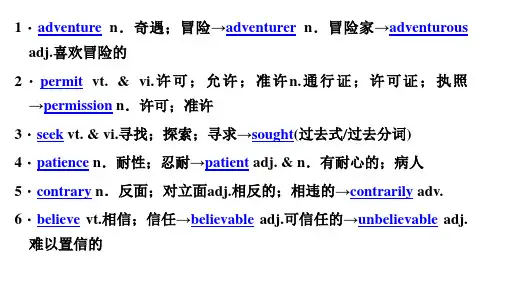
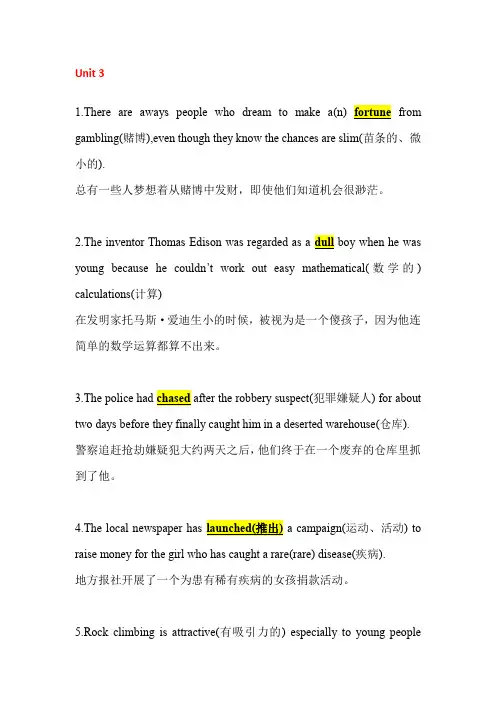
Unit 31.There are aways people who dream to make a(n) from gambling(赌博),even though they know the chances are slim(苗条的、微小的).总有一些人梦想着从赌博中发财,即使他们知道机会很渺茫。
young because he couldn’t work out easy mathematical(数学的) calculations(计算)在发明家托马斯·爱迪生小的时候,被视为是一个傻孩子,因为他连简单的数学运算都算不出来。
犯罪嫌疑人) for about two days before they finally caught him in a deserted warehouse(仓库).警察追赶抢劫嫌疑犯大约两天之后,他们终于在一个废弃的仓库里抓到了他。
运动、活动) to raise money for the girl who has caught a rare(rare) disease(疾病).地方报社开展了一个为患有稀有疾病的女孩捐款活动。
5.Rock climbing is attractive(有吸引力的) especially to young peoplebecause it is always with hardship(困难) and adventure.攀岩是具有吸引力的,尤其是对年轻人来说,因为它总是伴随着困难和冒险。
6.The face value(面值) of the bill(账单、钞票(内在的) value is nothing but that of a piece of paper.该票据面值为一美元,但其内在价值只是一张纸。
7.Having won several championships in international matches recently,hecurrently(目前among the world’s professional tennis players.在最近的国际比赛中赢得了几次冠军,他目前在世界上职业网球选手中排名第二。
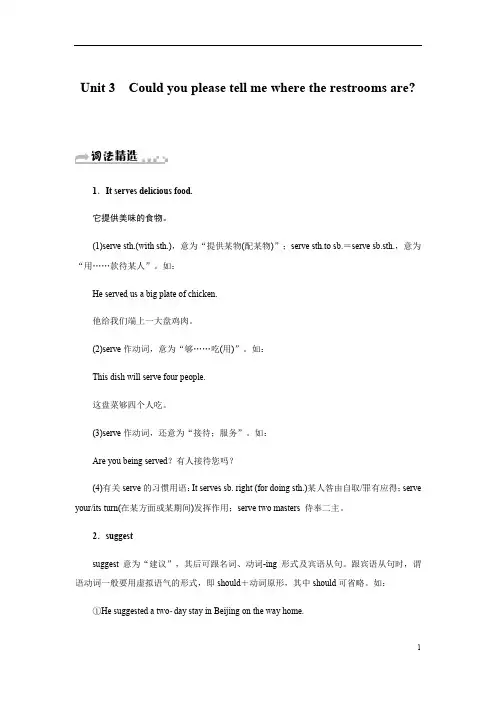
Unit 3Could you please tell me where the restrooms are?1.It serves delicious food.它提供美味的食物。
(1)serve sth.(with sth.),意为“提供某物(配某物)”;serve sth.to sb.=serve sb.sth.,意为“用……款待某人”。
如:He served us a big plate of chicken.他给我们端上一大盘鸡肉。
(2)serve作动词,意为“够……吃(用)”。
如:This dish will serve four people.这盘菜够四个人吃。
(3)serve作动词,还意为“接待;服务”。
如:Are you being served?有人接待您吗?(4)有关serve的习惯用语:It serves sb. right (for doing sth.)某人咎由自取/罪有应得;serve your/its turn(在某方面或某期间)发挥作用;serve two masters 侍奉二主。
2.suggestsuggest意为“建议”,其后可跟名词、动词-ing形式及宾语从句。
跟宾语从句时,谓语动词一般要用虚拟语气的形式,即should+动词原形,其中should可省略。
如:①He suggested a twoday stay in Beijing on the way home.他建议回家途中在北京停留两天。
②My father suggested sending for a doctor at once.我父亲建议马上派人请个医生。
③The teacher suggested that we (should) speak English as much as possible in class.老师建议我们尽可能在课堂上多讲英语。
3.depend on取决于depend on+名词/代词/宾语从句,意为“视……而定;取决于……”。
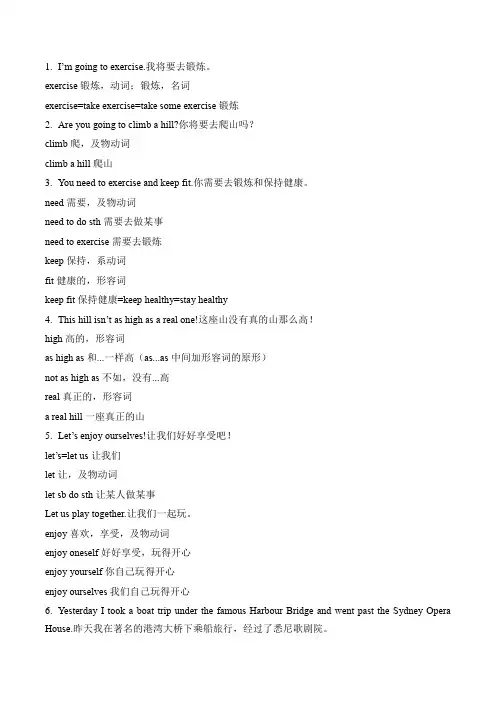
1.I’m going to exercise.我将要去锻炼。
exercise锻炼,动词;锻炼,名词exercise=take exercise=take some exercise锻炼2.Are you going to climb a hill?你将要去爬山吗?climb爬,及物动词climb a hill爬山3.You need to exercise and keep fit.你需要去锻炼和保持健康。
need需要,及物动词need to do sth需要去做某事need to exercise需要去锻炼keep保持,系动词fit健康的,形容词keep fit保持健康=keep healthy=stay healthy4.This hill isn’t as high as a real one!这座山没有真的山那么高!high高的,形容词as high as和...一样高(as...as中间加形容词的原形)not as high as不如,没有...高real真正的,形容词a real hill一座真正的山5.Let’s enjoy ourselves!让我们好好享受吧!let’s=let us让我们let让,及物动词let sb do sth让某人做某事Let us play together.让我们一起玩。
enjoy喜欢,享受,及物动词enjoy oneself好好享受,玩得开心enjoy yourself你自己玩得开心enjoy ourselves我们自己玩得开心6.Yesterday I took a boat trip under the famous Harbour Bridge and went past the Sydney Opera House.昨天我在著名的港湾大桥下乘船旅行,经过了悉尼歌剧院。
trip短途旅行,可数名词take a boat trip乘船旅行under在...的下面under the famous Harbour Bridge在港湾大桥下面go past经过=passthe Sydney Opera House悉尼歌剧院go past the Sydney Opera House=pass the Sydney Opera House经过悉尼歌剧院7.I’m having a great time in Australia!我在澳大利亚玩得很开心!have a great time=have a good time=have a nice time=have a wonderful time玩得很开心8.Take care!保重!care照顾,关怀,名词take care保重take care of...照顾...=look after...take good care of...照顾好=look after...welltake good care of yourself=look after yourself well照顾好你自己9.We’re sitting in a little coffee shop by the River Seine.我们正坐在塞纳河旁边的一个小咖啡馆里面。
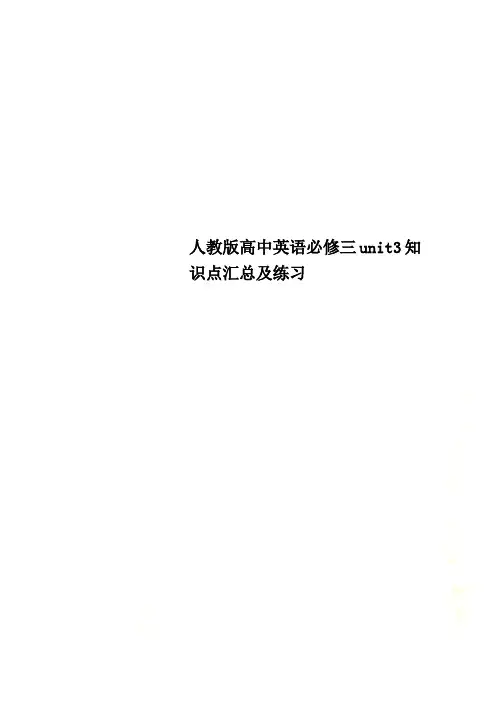
人教版高中英语必修三unit3知识点汇总及练习Ⅱ. 词性变化Ⅲ.重点词汇1. bet n. 赌;打赌v. 打赌;赌钱[典例]1). He often bets a 1ot of money on horses. 他经常在赛马上豪赌。
2). I bet that it will rain tomorrow. 我敢肯定说明天一定会下雨。
[重点用法]bet on为某事打赌make a bet on 为某事打赌win/lose a bet 打赌赢/输了[练习] 按要求翻译。
1).We ______ ______ ______ ______ (打赌)the outcome of the next horse race.2).他把所有的钱都用在赌马上。
_____________________________________________________________________ 2. fault n. 缺点;错误,过错;故障vt.挑剔,指责faulty adj.有缺点的;不完善的faultless adj.不可挑剔的[典例]1). I like him despite his faults. 虽然他有种种缺点, 但我仍然喜欢他。
2). No one could fault his performance. 他的演出无懈可击。
[重点用法]find fault (with sb/sth) 找(某人/事物的)错/茬儿;埋怨(某人/事物)It’ s one’ s fault 是某人的过错[练习] 按要求翻译或填空。
1). It was _______ _______ (他的过错) that we were late.2). I have no fault to find _______ (介词) your work.3). 她总是找我的茬儿。
_____________________________________________________________________ 3. spot vt. 发现;认出n. 污点;斑点;地点spotless adj. 没有斑点的,干净的[典例]1). She spotted her friend in the crowd. 她在人群中认出了她的朋友。
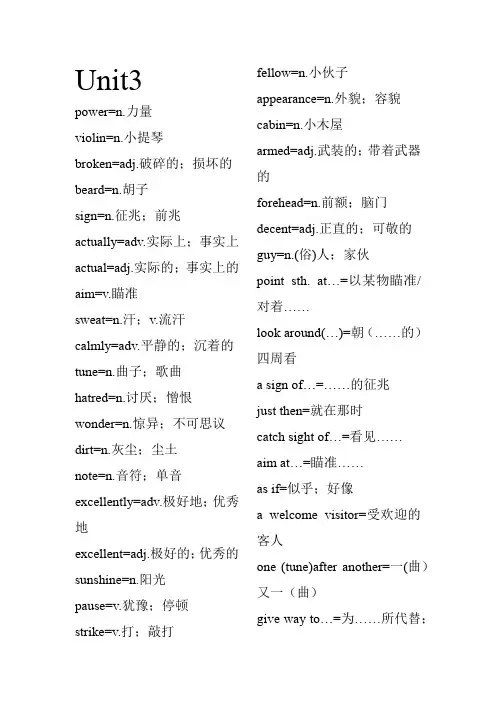
Unit3power=n.力量violin=n.小提琴broken=adj.破碎的;损坏的beard=n.胡子sign=n.征兆;前兆actually=adv.实际上;事实上actual=adj.实际的;事实上的aim=v.瞄准sweat=n.汗;v.流汗calmly=adv.平静的;沉着的tune=n.曲子;歌曲hatred=n.讨厌;憎恨wonder=n.惊异;不可思议dirt=n.灰尘;尘土note=n.音符;单音excellently=adv.极好地;优秀地excellent=adj.极好的;优秀的sunshine=n.阳光pause=v.犹豫;停顿strike=v.打;敲打fellow=n.小伙子appearance=n.外貌;容貌cabin=n.小木屋armed=adj.武装的;带着武器的forehead=n.前额;脑门decent=adj.正直的;可敬的guy=n.(俗)人;家伙pointsth. at…=以某物瞄准/对着……look around(…)=朝(……的)四周看a sign of…=……的征兆just then=就在那时catch sight of…=看见……aim at…=瞄准……as if=似乎;好像a welcome visitor=受欢迎的客人one (tune)after another=一(曲)又一(曲)give way to…=为……所代替;让路a look of…=……的样子beat time=打节拍die away=渐渐消失(be) deep in thought=沉思着have a talk with sb.=与某人交谈give oneself up(to…)=(向……)自首tell of…=表明……heaven=n.天空West Virginia=西弗吉尼亚州(美国)breeze=n.微风;和风miner=n.矿工dusty=adj.满是灰尘的dust=n.灰尘;尘土misty=adj.朦胧的mist=n.薄雾teardrop=n.泪珠remind… of…=使……回想起/意识到……far away=遥远的jazz=n.爵士乐classical=adj.古典的rock and roll=摇滚乐skyscraper=n.摩天楼hear of…=听说……singer=n.歌唱家guitar=n.吉他the Beatles=甲壳虫;披头士gain=v.获得;赢得international=adj.国际的acceptance=n.接受;接纳musically=adv.在音乐方面style=n.体裁;风格basic=adj.基础的;基本的aspect=n.方面content=n.内容harmony=n.协调commonly=adv.通常地;一般地ordinary=adj.普通的;平凡的loneliness=n.孤单;寂寞religion=n.宗教;信仰poetic=adj.诗意的poet=n.诗人tend=v.倾向;易于mirror=v.反映concern=n./v.关心;挂念achievement=n.成绩;成就lifestyle=n.生活方式time=n.(常用复数形式)时代remain=v.仍是;保持cultural=adj.文化的expression=n.表现力movement=n.运动;活动tradition=n.传统represent=v.代表;表示sorrow=n.忧愁;遗憾social=adj.社会的inequality=n.不平等later=adj.末期的talent=n.才能;才干create=v.创造;创作band=n.乐队voice=v.(用言语)表达;说出forever=adv.永远Southerner=n.南方人;南部人Hillbilly=n.[美][口]山里人;乡下人Lyric=n.(复)歌词melody=n.美的曲调;美的旋律rhythm=n.节奏;节拍emotion=n.感情;情感optimism=n.乐观(主义)celebrity=n.名人Forbes=《福布斯》杂志be known as=以......知名,被认为是......musically speaking=从音乐的角度来说be based on=以......为基础A rather than B=A而不是B working-class=工人阶级tend to=倾向于......at first=首先be concerned with=参与,干预sing of=歌颂......under the influence of=在...... 影响下the youth=青年人believe in=相信, 信仰。
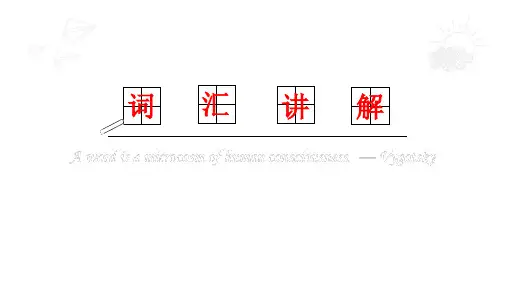
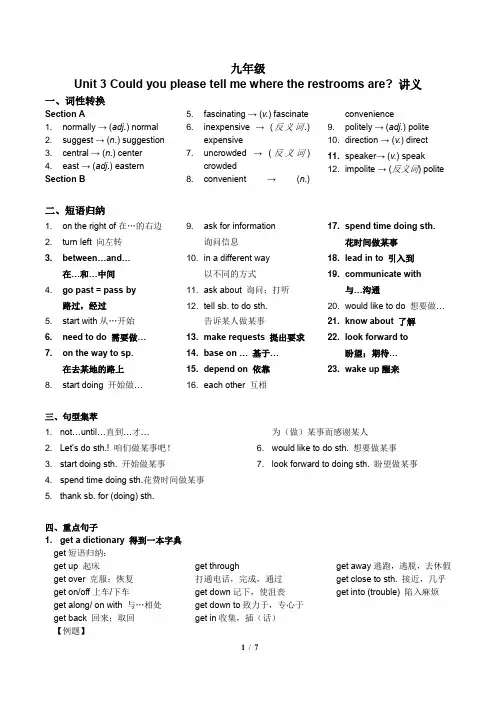
九年级Unit 3 Could you please tell me where the restrooms are? 讲义一、词性转换Section A1. normally → (adj.) normal2. suggest → (n.) suggestion3. central → (n.) center4. east → (adj.) eastern Section B5. fascinating → (v.) fascinate6. inexpensive → (反义词.)expensive7. uncrowded → (反义词)crowded8. convenient → (n.)convenience9. politely → (adj.) polite10. direction → (v.) direct11. speaker→ (v.) speak12. impolite → (反义词) polite二、短语归纳1. on the right of在…的右边2. turn left 向左转3. between…and…在…和…中间4. go past = pass by路过,经过5. start with从…开始6. need to do 需要做…7. on the way to sp.在去某地的路上8. start doing 开始做…9. ask for information询问信息10. in a different way以不同的方式11. ask about 询问;打听12. tell sb. to do sth.告诉某人做某事13. make requests 提出要求14. base on … 基于…15. depend on 依靠16. each other 互相17. spend time doing sth.花时间做某事18. lead in to 引入到19. communicate with与…沟通20. would like to do 想要做…21. know about 了解22. look forward to盼望;期待…23. wake up醒来三、句型集萃1. not…until…直到…才…2. Let’s do sth.! 咱们做某事吧!3. start doing sth. 开始做某事4. spend time doing sth.花费时间做某事5. thank sb. for (doing) sth.为(做)某事而感谢某人6. would like to do sth. 想要做某事7. look forward to doing sth. 盼望做某事四、重点句子1. get a dictionary 得到一本字典get短语归纳:get up 起床get over 克服;恢复get on/off上车/下车get along/ on with 与…相处get back 回来;取回get through打通电话,完成,通过get down记下,使沮丧get down to致力于,专心于get in收集,插(话)get away逃跑,逃脱,去休假get close to sth. 接近,几乎get into (trouble) 陷入麻烦【例题】1. buy a newspaper 买一份报纸buy 为非延续性动词,不能与how long及for引导的表示一段时间的状语连用。
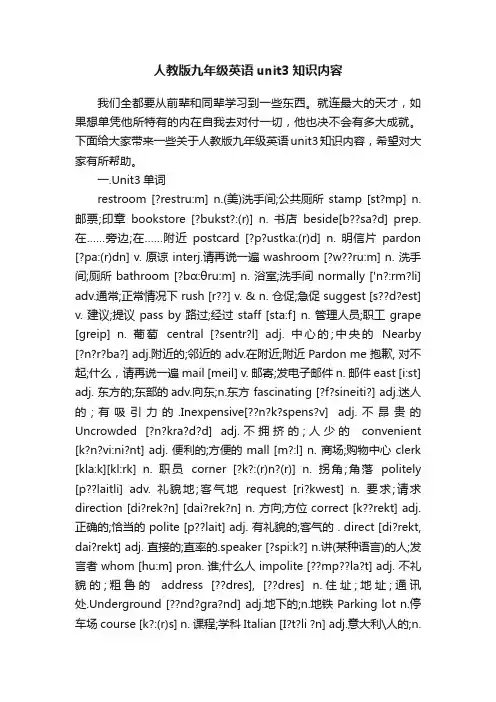
人教版九年级英语unit3知识内容我们全都要从前辈和同辈学习到一些东西。
就连最大的天才,如果想单凭他所特有的内在自我去对付一切,他也决不会有多大成就。
下面给大家带来一些关于人教版九年级英语unit3知识内容,希望对大家有所帮助。
一.Unit3单词restroom [?restru:m] n.(美)洗手间;公共厕所stamp [st?mp] n. 邮票;印章bookstore [?bukst?:(r)] n. 书店beside[b??sa?d] prep. 在……旁边;在……附近postcard [?p?ustka:(r)d] n. 明信片pardon [?pa:(r)dn] v. 原谅 interj.请再说一遍 washroom [?w??ru:m] n. 洗手间;厕所 bathroom [?bɑ:θru:m] n. 浴室;洗手间 normally ['n?:rm?li] adv.通常;正常情况下 rush [r??] v. & n. 仓促;急促 suggest [s??d?est] v. 建议;提议 pass by 路过;经过 staff [sta:f] n. 管理人员;职工 grape [greip] n. 葡萄central [?sentr?l] adj. 中心的;中央的Nearby [?n?r?ba?] adj.附近的;邻近的 adv.在附近;附近 Pardon me 抱歉, 对不起;什么,请再说一遍 mail [meil] v. 邮寄;发电子邮件 n. 邮件 east [i:st] adj. 东方的;东部的adv.向东;n.东方 fascinating [?f?sineiti?] adj.迷人的;有吸引力的.Inexpensive[??n?k?spens?v] adj.不昂贵的Uncrowded [?n?kra?d?d] adj.不拥挤的;人少的convenient [k?n?vi:ni?nt] adj. 便利的;方便的 mall [m?:l] n. 商场;购物中心 clerk [kla:k][kl:rk] n. 职员corner [?k?:(r)n?(r)] n. 拐角;角落politely [p??laitli] adv. 礼貌地;客气地request [ri?kwest] n. 要求;请求direction [di?rek?n] [dai?rek?n] n. 方向;方位 correct [k??rekt] adj. 正确的;恰当的 polite [p??lait] adj. 有礼貌的;客气的 . direct [di?rekt, dai?rekt] adj. 直接的;直率的.speaker [?spi:k?] n.讲(某种语言)的人;发言者 whom [hu:m] pron. 谁;什么人 impolite [??mp??la?t] adj. 不礼貌的;粗鲁的address [??dres], [??dres] n.住址;地址;通讯处.Underground [??nd?ɡra?nd] adj.地下的;n.地铁 Parking lot n.停车场 course [k?:(r)s] n. 课程;学科 Italian [I?t?li ?n] adj.意大利\人的;n.意大利人\语 Tim [tim] 蒂姆(男名)二.Unit3知识梳理【重点短语】1.a pair of 一对,一双,一副2.between A and B 在a和b之间3.on one’s / the way to 在去……的路上4.pardon me 什么,请再说一遍5.pass by 路过经过6.look forward to 盼望期待7.excuse me 打扰了请原谅8.get some information about 获取有关……的一些信息9.turn left\right 向左\向右转10.go past 经过路过11.a little earlier 早一点儿12.a good place to eat 一个吃饭的好地方13.in different situation 在不同的情况下14.on time 准时按时15.get to 到达16.have dinner 吃晚餐17.on one’s / \the right在右边e on 快点请过来19.the shopping center 购物中心20.the corner of....... 的角落/拐角处21.lead into 导入,引入【重点句型】1.问路常用的句子:①Do you know where is … ?②Can you tell me how can I get to …?③Could you tell me how to get to …?④Could/Will/Would you please tell me sth. 表示十分客气地询问事情Could you tell me how to get to the park?请你告诉我怎么才能去邮局好吗?2. decide to do 决定做…...She decided to go to have lunch. 她决定去吃午餐。


高中英语必修三Unit3单词1. diverse adj.不同的:多种多样的diversity n.差异(性);不同(点);多祥性2. fortune n.机会:运气气fortune cookie幸运曲奇3.gumbo n.秋葵汤(用秋葵荚做的浓鸡汤或海鲜汤)4.nachos n. [pl.] 墨西哥玉片5. chip (英)炸土豆条:(美)炸薯片:芯片:碎片6.cheese n.干酪;奶酪7.spicy adj加有香料的:辛辣的8.ethnic adj.具有民族特色的:异国风味的:民族的:种族的9.admit vi.&vt 承认vt.准许进入(或加入)10.definitely adv.肯定;确实11.occur vi. 发生:出现12.downtown adv.在市中心:往市中心13.mission n.传教(区);重要任务;使命14.districtn.地区;区域15.graffiti n. [pl]涂鸦;胡写乱画ic n.连环画杂志;漫画杂志;喜剧演员adj.滑稽的;使人发笑的17.afterwards(NAmE usually afterward) adv. 以后;后来18.head to .朝....前进;向.....去19.historical adj. (有关)历史的20.seek vt.& vi. (sought /s:t/,sought)寻找;寻求;争取: (向人)请求seek one's fortune寻找成功致富之路;闯世界21.earn/3an/v.&vi.挣得;賺得;赢得;博得earn a living谋生22.immigrant n. (外来)移民:外侨23. select vt. 选择;挑选;选拔24. china n.瓷;瓷器25. jazz n.爵士乐26.bar n.酒吧;小吃店;小馆子27.diagram n.简图;图解;图表:28. journal n.日志;日记;报纸;刊物29. claim v.&.n.夺取(生命);宣称;断言30. series n.系列;连续;接连series of系列或一连串(事件)31.apart from ( especially NAmE aside from )除了....外(还) ;此外32.minority n.少数民族;少数派;少数人33. escape vi.& vt. 逃走;逃脱;避开n.逃跑;逃脱;解脱34. bring about导致;引起35.Atlantic adj.大西洋的36.financial adj.财政的;财务的;金融的37. poetry n.诗集;诗歌;诗作38. jeans n.牛仔裤39. boot n.靴子40. mushroom n.蘑菇;蕈41. poisonous adj.引起中毒的;有毒的;分泌毒素的poison n.毒物;毒药;毒素 vt.毒死;毒害42. fold vt.包;裹;折叠vt.&vi.(可)折小;(可)叠平43. super adv.特别;格外 adj.顶好的;超级的44. collection n.作品集;收集物;收藏品44. accessory n.配饰;附件;配件45. souvenir n.纪念物;纪念品46. percentage n.百分率;百分比47. climate n.气候48. mild adj.温和的;和善的;轻微的49.settle vt.& vi.定居;结束(争论);解决(纠纷)49. construction n.建筑;建造;建造物; (句子、短语等的)结构50. material n.材料;布料;素材 adj.物质的;实际的51. to name but a few仅举几例52. tai chi (also t'ai chi)n.太极拳52. clothing n.衣服;服装54. herbal adj.药草的;香草的55. suit vt. 适合;满....需要;相配;合身n.西服;套装56. [at) first hand第一手;亲自57. item n.项目; -件商品(或物品);一条(新闻)58. contain vt.包含;含有;容纳59. contain vt.包含;含有;容纳图60. neat adj.极好的;整洁的;整齐的61. San Francisco 圣弗朗西斯科(旧金山) ( 美国城市)62. Napa Valley 纳帕谷(美国)62. the Golden Gate Bridge金门桥63. the Mission District教会区(旧金山)人64. Mexico 墨西哥(北美洲国家)65.California 加利福尼亚( 美国州名)65. Cantonese adj.广东的;粤语的n.粤语;广东人66. the Richmond District里士满区(旧金山)67. Huangguoshu Waterfall 黄果树瀑布68Journey to the West《西游记》69. Tin How Temple天后古庙70. Bank of Canton 广东银行71. Potsmouth Square花园角广场(旧金山)72. Robert Louis Stevenson罗伯特●路易斯.斯蒂文森 (英国作家)。
高中英语必修三unit3单词表Unit 3 Words1. agency(n. 机构)An agency is responsible for promoting a product or service on behalf of a client.2. analyze(v. 分析)It is important to analyze the data thoroughly before drawing any conclusions.3. behavior(n. 行为)The child's behavior in class has improved significantly since the beginning of the semester.4. data(n. 数据)The scientist collected a vast amount of data from the experiment to analyze.5. definite(adj.明确的)There is no definite answer to the question, as it depends on various factors.6. engage(v. 参与)Students are encouraged to engage actively in class discussions to enhance their learning.7. ensure(v. 确保)The company implemented strict safety measures to ensure the well-being of all employees.8. ethnic(adj. 种族的)The celebration featured a variety of ethnic foods and performances.9. exhibit(v. 展示)The artist will exhibit her latest paintings at a gallery downtown.10. fulfill(v. 履行)It is essential to fulfill your responsibilities in a timely manner.11. improbable(adj. 不可能的)It is highly improbable that the team will win the championship this year.12. inspector(n. 检查员)The safety inspector visited the construction site to ensure compliance with regulations.13. interpret(v. 解释)It can be challenging to interpret the results of a complex study.14. mechanism(n. 机制)The mechanism of action of the new drug is not yet fully understood.15. occur(v. 发生)The accident occurred early in the morning, causing a traffic jam.16. ongoing(adj. 持续的)The negotiations between the two parties are ongoing and have not reached a conclusion yet.17. principal(n. 校长)The principal of the school is dedicated to providing a quality education to all students.18. ratio(n. 比率)The ratio of male to female students in the class is almost equal.19. sequence(n. 序列)It is important to follow the correct sequence of steps when assembling the product.20. series(n. 系列)The television show is popular and has been renewed for another series.21. shift(n. 转变)There has been a shift in consumer behavior towards more sustainable products.22. signal(n. 信号)The traffic light turned red, signaling drivers to stop.23. statistic(n. 统计数字)The statistics show a decrease in unemployment rates in the region.24. status(n. 状态)The company is currently in a stable financial status.25. stress(n. 压力)The deadline is approaching, causing stress among team members.26. substitute(v. 代替)The chef had to substitute an ingredient in the recipe due to its unavailability.27. target(n. 目标)The company set a target of increasing sales by 20% this quarter.28. token(n. 表示)As a token of appreciation, the organization presented the employee with a gift.29. trend(n. 趋势)There is a growing trend towards online shopping among consumers.30. visible(adj. 明显的)The impact of climate change is visible in the melting ice caps.In conclusion, the vocabulary in Unit 3 of the high school English course provides students with a solid foundation in various aspects of language and communication. By mastering these words, students will be better equipped to understand and analyze complex texts, express their ideas clearly, and engage actively in discussions. Whether it is discussing social issues, interpreting data, or analyzing behavior, the vocabulary in Unit 3 is essential for students to fulfill their academic potential.。
人教版七年级英语上册unit 3句式讲解及知识梳理一、Unit3 单词pencil ['pensl] n.铅笔book [bʊk] n.书eraser [ɪ'reɪsə] n.橡皮box [bɒks] n.箱;盒pencil box 铅笔盒;文具盒schoolbag ['skuːlˌbæg]n.书包dictionary ['dɪkʃəneri]n.词典;字典his [hɪz] 他的mine [maɪn] pron.我的hers [hɜːz] pron.她的excuse [ɪks'kjuːz] v.原谅;宽恕me [miː] pron.(I 的宾格)我excuse me. 劳驾;请原谅thank [θæŋk] v.感谢;谢谢teacher ['tiːtʃə] n.老师; 教师about [ə'baʊt] prep.关于What about…? (询问消息或提出建议)……怎么样?……好吗?yours [jʊəz] pron.你的;你们的for [fɔː] prep.为了;给;对thank you for… 为……而感谢help [help] v.&n.帮助;援助welcome ['welkəm] adj.受欢迎的You're welcome. 别客气。
baseball ['beɪsˌbɔːl] n.棒球watch [wɒtʃ] n.表;手表computer [kəm'pjuːtə] n.计算机;电脑game [geɪm] n.游戏;运动;比赛card [kɑːd] n.卡片ID card 学生证;身份证notebook [ˈnəʊtbʊk] n.笔记本ring [rɪŋ] n.戒指bag [bæg] n. 袋;包in [ɪn] prep.在……里library['laɪbrəri] n.图书馆ask [ɑːsk] v.请求;要求;询问ask…for… 请求;恳求(给予)find [faɪnd]v.(过去式、过去分词found)找到;发现some [sʌm] adj.pron.一些;某些;有些;有的classroom ['klɑːsrʊm] n.教室e-mail (=email) n.电子邮件at [æt] prep.(提供电话号码等时使用)按照; 根据;在(某处、某时间或时刻)call [kɔːl] v.(给……)打电话lost [lɒst] v.(动词lose 的过去式) 遗失;丢失must [mʌst] modal v.必须set [set] n.一套;一副;一组 a set of 一套;一副;一组二、Unit3 知识梳理Unit 3 Is this your pencil?【重点短语】1.your schoolbag 你的书包2.his green pen 他的绿色的钢笔3.Anna’s books 安娜的书4.her dictionary 她的字典5.ask the teacher for ... 向老师要……6.thank you for ... 因 ... 而谢谢你puter games 电脑游戏8.in Classroom 7E 在7 E 教室里9.in the school library 在学校图书馆10.call me 给我打电话11. call me at 495-3539 拨4 9 5 -3 5 3 9 打电话给我12.e-mail me at... 用……给我发电子邮件13.my school ID card 我的学生卡14.a set of keys 一串钥匙15. some keys 一些钥匙【重点句型】1.—What’s this? 这是什么?—It’s a watch. 一块手表。
Unit 3TEXT ANew wordscampusn.[C, U] the land and buildings of a university or college (大学或学院的)校园All freshman students live on campus. When they are in their second year at college, they may live off campus. 所有大学一年级的学生都住在校园里。
大学二年级时,他们可以住在校外。
transformvt.completely change the appearance, form, or character of sth. or sb., esp. in a way that improves it 使改观;使变形;使转化The president of the university said that they were trying their best to transform their university into a top school in the country. 这个大学的校长表示,他们正竭尽全力把他们的学校建设成为全国的一流大学。
fleetn.[C] a group of vehicles, planes, boats, or trains, esp. when they are owned by one organization or person 车队;机群;船队Survivors were taken to a hospital in a fleet of ambulances. 幸存者被救护车队送往医院。
FedEx has a fleet of trucks. 联邦快递有卡车车队。
typicala.like most things of the same type 典型的;有代表性的Notice the sentences in the text that are relatively long, which is typical of a news report. 注意这篇文章中的句子比较长,这在新闻报道中是很典型的。
## 1. Difficult Sentences1. (Para. 2) For every writer kissed by fortune, there are thousands morewhose longing is never rewarded.1. How do you understand “every writer kissed by fortune”?(=It means the writer who can achieve success.)2. Translate the sentence into Chinese.(=幸运之神会眷顾一些作家,但数以千计的人心中的渴望永远无法满足。
) 2. (Para. 4) This is the Shadowland of hope, and anyone with a dreammust learn to live there.1. What is “the Shadowland of hope” like?(=It is a state of poverty, neglect, and fear of failure.)2. In the phrase “anyone with a dream”, what kind of dream it is?(=It is the dream to achieve success.)3. (Para. 5) He had once lent me a few bucks and liked to egg me aboutit.1. “Buck” is a rather informal word. What is its formal counterpart?(=It is “dollar”.)2. How do you understand the expression “egg me about it”?(=It is a slangy expression, meaning “annoyingly remind me of it”.)5. (Para. 9) From deep inside a bull-headed resolution welled up.1. What is the author’s “bull-headed resolution”?(=His resolution to become a full-time writer.)2. What kind of person do you know about the author from thissentence?(=He is a very determined person, sticking to his dream.)6. (Para. 10) There Alex, I said to myself. There’s everything you’vemade of yourself so far. I’m not sure I ever felt so low.1. What has the author made of himself so far?(= Two cans of sardines and 18 cents.)2. Translate the sentences into Chinese.(=我对自己说,看吧,亚历克斯,这就是你的全部家当了。
我觉得前所未有的沮丧。
)7. (Para. 13) These were stories that black Americans had tended toavoid before, and so I mostly kept them to myself.1. What were the stories that black Americans had tended to avoidbefore?(=The stories about their families and slavery.)2. What did the author do with the stories before?(=He seldom told others the stories.)8. (Para. 18) For the first time I had money and open doors everywhere.1. How do you understand “open doors” in this sentence?(= “Open doors” refer to opportunities in the author’s life.)2. What can be inferred from this sentence?(=With the publication of Roots, the author achieved great success and became well-known. He was no longer the poor young man he used to be.)9. (Para. 20) And I said to myself, The things in this bag are part of myroots, too. I can’t ever forget that.Why did the author say the things in this bag were part of his roots, too?(=Because the things reminded him of his past before he achieved success. Although he became a famous writer, he thought he should remember the time when he was striving for success.)10. (Para. 21) But only one reminds me of the courage and persistenceit takes to stay the course in the Shadowland.1. What does the “one” refer to in this sentence?(=It refers to the clear plastic case in which the two sardine cans and 18 cents were kept.)2. Translate the sentence into Chinese.(=但只有一样东西会提醒我,在梦想的阴影里坚持自己的方向需要怎样的勇气和毅力。
)11.How do you understand the expression “egg me about it”?It is a slangy expression, meaning “annoyingly remind me of it”.## 2.Words and Expressions1. (Para.1) many a: (formal)a large number of people or thingsMany a strong man has weakened before such a challenge.Many a famous pop star has been ruined by drugs.N. B.注意该词组应与单数名词、单数动词连用。
2. (Para. 2) reward:1. n.1) sth. that you get because you have done sth. good or helpful orhave worked hardHe received a medal in reward for his bravery.2) money that is offered to people for helping the police to solve acrime or catch a criminalA $1000 reward has been offered for the return of the stolenpainting.2.v.give sth. to sb. because they have done sth. good or helpful orhave worked for it(声音文件reward)(=Is this how you reward me for my help?)She rewarded him with a smile.CF: reward, award & honor这三个词都是名词,都有“奖赏”、“奖励”之意。
reward意为“报答”、“奖赏”、“酬金”,侧重指因为付出而应得的报酬,如对做好事或者努力工作的报答,也可以指对帮助寻回失物或缉拿犯人等而给予的酬金。
例如:The rewards of study cannot always be measured in money. award比较正式庄重,指由于某方面出色成就、卓越贡献而正式给予的褒奖,可指精神奖励或物质的奖励。
一般指官方给予的奖励。
例如:He received awards from the government for his greatcontribution to scientific studies.Honor比较常用,可用于正式或非正式场合,表示尊敬或敬意。
有时可指显示荣誉的东西,如奖品、勋章、称号等。
例如:The visiting president was given the honor of a twenty-one gunsalute.3. (Para. 2) neglect:1. n. failure to look after sth. or sb., or the condition of not being lookedafter; failure to pay proper attention to sth.那花园疏于打理。
(=The garden was in a state of neglect.)He lost his job because of neglect of duty.2. v.1) pay too little attention to sth.neglect their warnings(=不顾他们的警告)neglect her appearance(=忽视她的外貌)2) not do sth.He neglected to write and say “Thank you.”CF: neglect, ignore & forget这三个词都是动词,都有“忘记”、“忽略”、“遗漏”之意。